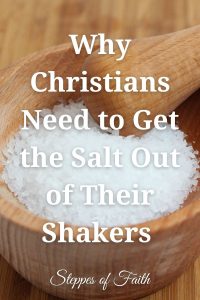
In the Similitudes of the famous Sermon on the Mount, Jesus says we are the salt of the earth. Some Christians may take this simply to mean we are supposed to be the nice guys—kind, dependable, honest, and always wearing a big smile. While that may be true, that is not what Jesus is saying. Instead, He is instructing us about our role in the world and the responsibility we have.
We are the Salt
Long before refrigeration, people used a variety of techniques to preserve their food. Some of the more common methods were drying, smoking, salting, and burying food in the ground to take advantage of the earth’s natural cooling elements. In first-century Israel, people preserved their meat mainly by covering it with salt.
Salt was such an essential ingredient to have in one’s kitchen that Roman soldiers were paid in pounds of it every month (it is where the word salary comes from, loosely meaning “salt money”). The better a soldier performed and behaved, the more salt he received (or a sizable stipend to buy it). The worse a soldier was, the less salt he received. The practice is how we got the saying “worth his weight in salt.”
Because salt was such an important commodity, it was the perfect illustration for Jesus as He preached a special message that believers are to perform the same functions as salt.
Just as salt preserves food, we are to preserve the earth. But Jesus isn’t talking about gardening. He’s talking about preserving people.
The Work of Preservation
Notice Jesus says we are the salt “of the earth,” not “in the earth” or “on the earth.” We are “of the earth.” His choice of words means believers are a part of the world. We walk among non-believers and believers alike. And as we intermingle with such a variety of people every day, we preserve them by making a positive, godly impact on them.
In the Sermon on the Mount, Jesus encourages His audience to share His message with others. Today, we call it the Good News of the gospel. If we are going to preserve believers for the kingdom of heaven, then we need to speak truth into people’s lives to help them stay on a righteous path. Our salt helps to prevent their spiritual and moral decay.
And not only believers. Being salt means we also share the gospel with non-believers with the hope of leading them to God’s grace. We speak life into their lives so God can deliver and heal them from any decay they might have.
Don’t Lose Your Salt
“But if the salt loses its flavor, how shall it be seasoned?” Matthew 5:13
Several theories exist about what Jesus meant when He said salt could lose its flavor. Some people theorize Jesus was referring to salt rock where people would sometimes store their meat. If the salt leached out of the rock, the salt was no longer useful. Others theorize Jesus was talking about salt blocks that bakers used. Over time, the heat in their ovens would ruin the salt, and it would be worth nothing except maybe to control weeds. Still, others suggest Jesus’ question is rhetorical.
But perhaps Jesus was simply talking about faith.
He knows people will lose their vigor and enthusiasm for sharing the gospel. Work gets busy, the kids need to get to soccer practice or dance class, the laundry must be washed, and the grass needs to be mowed, all of it distracting us from being salt. The busyness of life is why Jesus cautions that salt can lose its flavor. It can lose its effectiveness.
It is the same with people who have gone off the righteous path of Christ. Believers who engage with false doctrines or fall into unrighteous behavior lose their purity. Unfortunately, over time, the result may be their eventual worthlessness in the body of Christ.
Charles Swindoll put it like this: “We must do a work of preservation … or we lose our influence and become as insignificant as a layer of dust on city streets.”
Doing the work of preservation means getting into God’s word and developing an active, loving relationship with Him. It is then we will have salt in our lives and peace with others (Mark 9:50).

Impure vs. Pure Salt
Scientifically, salt cannot lose its saltiness. It is a natural element that can only be altered chemically. But even in its natural state, it can be either pure or impure.
Impure salt has very little flavor. Many members of Jesus’ audience no doubt were familiar with impure salt. The nearby Dead Sea is so full of gypsum and minerals that the taste of its salt is flat. It doesn’t matter how much you use; it will not help your cooking.
Pure salt, on the other hand, cannot lose its flavor. When we have pure salt, we become excited about our faith and choose to keep God front and center every day. Those who do, do not lose their flavor. Excited believers can’t wait to talk about Jesus. And if they are not talking about Him, their joy is undeniable and, hopefully, contagious. That kind of joy is what Jesus referred to when He also spoke about shining our light in Matthew 5:16.
“Let your light so shine before men that they may see your good works and glorify your Father in heaven.”
If we want to prepare a great meal, we must use pure salt. And if we want to keep the gospel message going, if we want others to get excited about it, if we want to make a positive impact for Christ, we too must be pure. We must be pure in heart if we want to bless others.
A Good Tool to Use
Just before Jesus says we are the salt of the earth, He explains why we must preserve others for His kingdom and make a positive impact.
“Blessed are you when they revile and persecute you and say all kinds of evil against you falsely for My sake. Rejoice and be exceedingly glad, for great is your reward in heaven.” Matthew 5:11-12
Followers of Christ often endure criticism and, perhaps, persecution from unbelievers, which is why we should fervently seek to be salt. If we persist and do not give up in doing good (Galatians 6:9) in preserving others from increasing decay, if we can continue in our faith, Jesus says He will bless us. This is a beautiful promise.
So, how do we preserve others? The apostle Paul gives us one idea in the book of Colossians.
“Let your speech always be gracious, seasoned with salt, so that you may know how you ought to answer each person.” Colossians 4:6
Jesus knows unbelievers will revile us. He knows we will be pushed aside, labeled as mindless fools, and told we live in fear of reality. Paul replies by suggesting a tool to use: our speech.
Just as we seek to preserve others, we preserve ourselves by being careful of how we talk to others (Ephesian 5:4). We speak with persistent grace and kindness.
We also preserve our minds by reading God’s word and placing it in our hearts so when unbelievers scorn us, we know what and how to answer them.

Get Out of the Shaker
“If you want to awaken your full potential, you have to start on a solid foundation—one based on the Word of God. That involves more than just knowing, studying, or memorizing His Word. You must act on it. The power of His promises remains dormant unless activated by your faith through what you do.” -Dr. Tony Evans
Salt must be applied before it can be useful. We must get it out of the container. To do that, we typically do not pour it into a pile; we shake it out and sprinkle it around.
For believers, it means we cannot be effective in God’s kingdom work if we stay inside the four walls of the church.
If we are truly going to be salt, we must get out of the shaker.
One of Jesus’ final commands was, “Go therefore and make disciples of all the nations (Matthew 28:19).” The operative word here is “go.” We must get out of the church (the saltshaker) and spread our salt around. Sitting in church on Sundays is fine, but we must go out into the world on the other six days of the week and preserve others for Christ. We must disciple them and build them up for the glory of God.
Staying in the shaker makes our salt impure and flavorless. It becomes ineffective and worthless. And, in the end, we lose our value in the body of Christ. Our salvation will still be intact, but our witness becomes hollow and meaningless.
Too many Christians stay in the shaker.
“The harvest truly is great, but the laborers are few.” Luke 10:2
If we want to preserve others before they are lost forever to sin and wickedness and, eventually, hell forever, we must go. We must get out of the shaker and liberally spread the gospel, inspiring good flavor in others.
We live in a fallen world that continues to fall deeper and deeper in sin. Many will be lost forever to wickedness and, eventually, hell. And it will continue until the Day of the Lord. Until then, we must get out of the shaker. We must go into the world, liberally spread the gospel, and do the work of the Lord of preserving others for Him. The only question is, who will go?
“We are here as ‘salt of the earth,’ to be a blessing to the world. We are here to glorify Christ in our daily life. We are here as workers for him, as ‘workers together with him.’” -Charles Spurgeon
